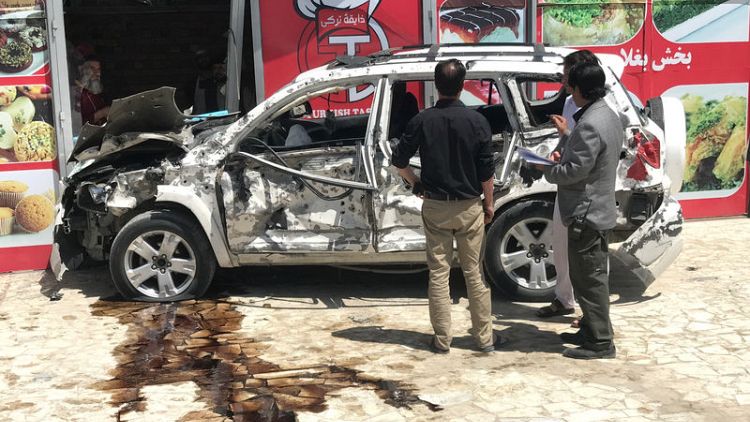By Abdul Qadir Sediqi and Sayed Hassib
KABUL (Reuters) - A car bomb attack on a U.S. convoy in the Afghan capital on Friday, wounded four U.S. service members and killed at least four Afghan civilians, officials said, in the second attack in the city in two days.
The Taliban claimed responsibility for the blast, which came a day after the Islamic State militant group claimed a suicide attack outside a military training academy that killed at least six people.
A spokesman for U.S. Forces in Afghanistan confirmed that a car bomb hit a U.S. convoy and four service members had suffered minor injuries in the explosion but gave no other details.
An interior ministry spokesman said four Afghan civilians had been killed.
The blast sent a plume of white smoke into the air and spread debris across the busy Jalalabad road in the city's east, an area with several large security compounds which has seen repeated attacks over the years.
But other officials said as many as nine people had been killed with varying estimates of the number of wounded.
"I was hit in the head by flying glass and many people have suffered injuries," said Abdul Qayum, who was wearing a bandage around his head.
The main Taliban spokesman, Zabihullah Mujahid, said in a statement the attack targeted a convoy of "senior foreign advisers", killing 10 and destroying two vehicles.
Witnesses said at least three armoured Land Cruiser vehicles were in the convoy, one of which was heavily damaged in the explosion and removed from the scene by crane as Afghan and U.S. troops guarded the scene while firefighters cleaned up.
Kabul has been on high alert in recent days, with security checkpoints reinforced, despite increased diplomatic efforts to open a peace process to end 18 years of war in Afghanistan.
Friday's attack, shortly before next week's Eid al-Fitr holiday, came as a delegation of Taliban officials met senior Afghan politicians in Moscow this week for discussions which the main Taliban spokesman said had made good progress.
The Taliban have been talking with U.S. diplomats for several months to agree a withdrawal of more than 20,000 U.S. and NATO coalition troops in exchange for guarantees that Afghanistan would not be used as a base for militant attacks.
Following a ceasefire last year over the Eid holiday, there had been hopes that a truce would be agreed for this year's holiday, which comes at the end of the Muslim holy month of Ramadan.
But Taliban officials have said that did not appear likely.
(Additional reporting by Hamid Shalizi; Writing by James Mackenzie; Editing by Clarence Fernandez, Robert Birsel)
